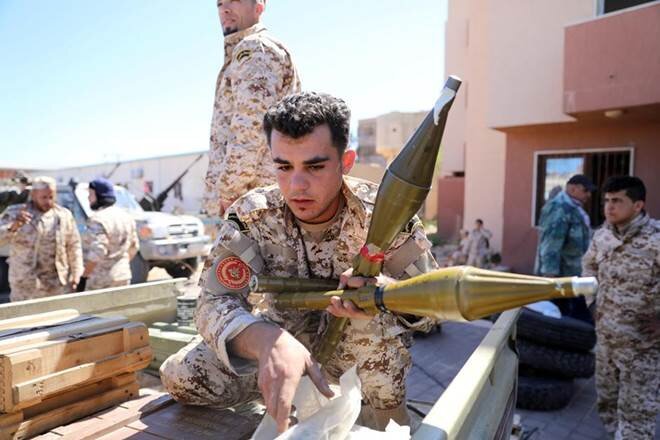Members of militias under the protection of Tripoli’s government, unload weapons. Libya April 8, 2019. (Reuters)
As the domination of coronavirus in the international headlines wanes, news from war torn Libya is again getting attention. But of what significance is the swift military reversals of the last few weeks, who are the parties continuing to fight nine years after the dawn of the Arab Spring, and why are Russia and Turkey so involved in the conflict? Apart from the infamous incident at Benghazi, most westerners are not able to put these new headlines into the overall context of the Libyan Crisis, which spans almost a decade and includes two civil wars. This special Wire briefing gives background to the current events unfolding in Libya.
Arab Spring Protests, the First Civil War, and the Benghazi Attack
In the spring of 2011, a series of largely peaceful protests arose across the Arab world. Anti-entrenched regimes, these demonstrations were evidence of a hopeful new generation that wished to see positive changes for the future of these countries of the Middle East and North Africa.
While transfers of power occurred in countries like Egypt and Tunisia as a result of the Arab Spring protests, it was not so in Libya. Muammar Gaddafi, the de-facto leader of Libya who abolished the monarchy and the old constitution and proclaimed the new Libyan Arab Republic in a bloodless coup in 1969, tried to violently suppress the demonstrations in his county.
Gaddafi’s government’s reactions and measures to the protests were so extreme, the demonstrators began to arm themselves and civil war broke out between the Gaddafi loyalists and various rebel groups. These smaller groups were held together by the common goal to rid Libya of Gaddafi and this anti-Gaddafi coalition was termed the National Transitional Council (NTC). In the fighting that followed, the accusations of atrocities committed by the Gaddafi loyalist forces against non-combatants led to UN sanctions, the US freezing $30 billion of Gaddafi’s assets, NATO airstrikes, and arrest warrants from the International Criminal Court for crimes against humanity. Partially due to this concurrence of events and partially due to the rebel forces successfully capturing the capital Tripoli, in October 2011 Gaddafi was ousted after 42 years of power. Subsequently, Gaddafi was killed as rebel forces took control of the last of his strongholds, and the civil war was over.
With the fall of Gaddafi, a complex security vacuum was left and the tie that bound the National Transitional Council together weakened significantly. Many of the smaller militias refused to lay down their weapons and join the official Libyan Army, which created a chaotic and fertile ground for violence, instability, and proliferation of extremists.
On September 11, 2012, Ansar al-Sharia—Al-Qaeda affiliated militants—attacked the US consulate in Benghazi. In the attack, the US Ambassador and three others were killed, which, beyond causing international outcry and considerable scandal in the US, caused a major crackdown on the many non-sanctioned militias roaming Libya by the Libyan Army, sparking an escalation of violence which eventually erupted into the second Libyan Civil War in 2014.
The Second Civil War and Proxy Fighting
With the results of the Libyan 2014 election widely disputed, and concerns about creeping Islamist influence, the Libyan government split in two. Those two factions, and their various backers both foreign and domestic, are still in conflict today.
What has now come to be know as the Tripoli government, or the Government of National Accord (GNA), is headed by Feyez Sarraj. This government is recognized at the legitimate government by the UN, is backed by a wider Islamist coalition known as "Libya Dawn" and other militias, and is aided by Qatar, Sudan, Pakistan, Italy, and Turkey.
The Tobruk government, taking its name from the city where it shifted its administrative center to, is strongest in eastern and southern Libya, and is essentially led by the powerful General Khalifa Haftar, commander of the Libyan National Army (LNA). The LNA has the support of Egypt, the United Arab Emirates (UAE), Russia, Saudi Arabia, Bahrain, Jordan, and France. The 76 year old warlord Haftar sees himself as protecting Libya from falling into the hands of extremists, while his opponents view him as a dictator in the making—a Gaddafi 2.0.
In 2019, the Haftar-led LNA made a concerted bid to take Tripoli. With the capture of the last territory held by the Tripoli government, it was hoped that the war could end and the process of reaching political health and wholeness could begin. As the LNA was the best-equipped fighting force in the country, with mercenaries from Russia and drones from the UAE, the fall of the Tripoli government seemed inevitable.
All this shifted rather dramatically when the Tripoli government signed a controversial maritime boundary agreement with Turkey, giving Ankara access to vast natural gas reserves in the eastern Mediterranean. In exchange for this access, Turkey increased its military support to the GNA, sending weapons, drones, and Syrian mercenaries to fight for the cause of the besieged Muslim Brotherhood government, and push back several of the strategic holdings of the LNA.
With Turkey turning the tide so quickly, the conflict is gaining new life as an all-out proxy war in the style of Syria. UN, NATO, and European leadership in the Middle East has waned to the point of ineffectiveness, and Russia and Turkey are emerging as the potential kingmakers—standing to gain billions of dollars in oil revenue, gas and construction contracts, and strategic base locations in north Africa.
Like the Syrian civil war, Russia and Turkey find themselves on opposing sides of the conflict in Libya. This leaves third parties involved with the rather hard choice of supporting either Turkish ascendancy or Russian encroachment as the deciding influential power in the Middle East. Without dramatic intervention and shifts in the status quo, it’s possible that Libya will be headed in the same direction as Syria, a fate not to be wished on anyone or any state.
Sources:
https://www.newyorker.com/magazine/2015/02/23/unravelling
https://time.com/5569624/whats-happening-in-libya/
https://www.britannica.com/event/Libya-Revolt-of-2011/Libya-facts-and-figures#ref300038
https://www.politico.eu/article/the-libyan-conflict-explained/
https://www.faimission.org/wire/libyan-capital-under-heavy-barrage-as-civil-war-escalates






